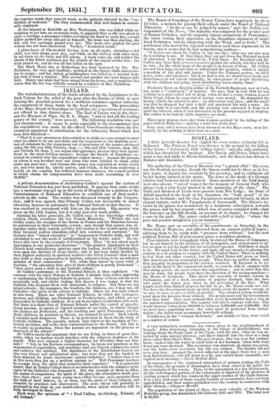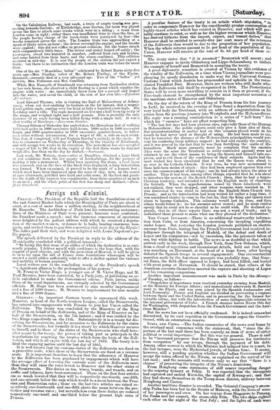SCOTLAND.
A little juvenile disaster has rippled the even surface of family life at Balmoral. The Princess Royal was thrown to the ground by the falling of her horse—" fortunately with trifling injury," says the only authority which has chronicled the incident. The Queen and Prince Albert have spent a day and night at Alt-na-Guithsach ; and the Queen has driven to Balloter and A.berarder.
The gathering of the Clans at Braemar was "a grand affair" this year, say the Scottish accounts, though the Queen could not be there as in for- mer years, to dignify the occasion by her presence, and to exhilarate all by her hearty interest in the sports. The news of the death of a German relative had been too Lately received. Some members of the Duff family were also absent, "out of respect for the memory of General Duff, -who always took a very lively interest in the mustering of the clans." The Duke and Duchess of Leeds were present from Mar Lodge ; the Duke of Atholl marched at the head of his clansmen, the "body guard" of the Queen in Scotland ; and the elan Farquharson mustered strongly, in their elegant tartans, under Mr. Farquharson of Invereauld. The Queen's in- terest in the games was manifested by a handsome subscription towards the prizes, and by her request—which was of course complied with—that the foot-race up the hill should, on account of its danger, be changed for a race in the park. The games ended, with a ball at night, " wills° the peer and peasant mingled in joyous harmony."
Mr. Hume met an assembly of his constituents on Saturday, in the Town-hall of Montrose, and addressed them on current political topics ; advising them to be ready with "pressure from without," lest the new political Reform Bill of next session prove a worthless abortion. Class interests were triumphant when he entered the House of Commons ; but he set himself to the abolition of all monopolies, and endeavoured to al- low no man to put his hand into his neighbour s pocket. Still there is much to do. We must look to the future, and apply all our energies to placing the country in a fit position to compete with the United States. There is nothing to fear from any other country, but the United States will press us her The Americans are an economical people. They have no useless offices, and they pay,,only in proportion to the services received. If England is to re- main at the head of the commercial world, or even be able to compete with that rising power, she must reduce her expenditure ; and in order that this may be done, the people must have the direction of the taxing-machine- the House of Commons. This shows the necessity of further reform in Parliament, and of a fresh accession of popular strength, that the bees who make the honey may share in the governing of the hive. What length Lord John Russell proposes his bill to go, Mr. Hume could not tell. Nor have the Government made up their minds about the matter—except, as we may be sure, to give as little as possible. The extent of reform would de- pend upon the pressure from without. The people must tell the Government what they want. They must demand that every householder have a vote in the national representation. The country will not be content with less. This would increase voters from 900,000 to between 3,000,000 and 4,000,000. But we must have something more : the voter must be protected from intimi- dation; the ballot must accompany household suffrage. Confidence in the "veteran Reformer," and thanks to him, were voted as a matter of course.
A very melancholy occurrence has taken place in the neighbourhood of Lanark. John Armstrong, belonging to the village of Firkfieldbank, was walking along the South bank of the Clyde, with his wife, when he was at- tacked by some suicidal phrensy, and threw himself into the river at a deep place called Mary Dick's Hole. The poor woman, who was near her confine- ment, rushed into the water to catch hold of her husband, when both went down and were drowned. The occurrence was observed, an alarm was given, and the bodies were recovered, but life was extinct. The fatality did not even stop here : amongst the crowd collected at the place there was a man from Kirkfieldbank, who fell down in a fit, was carried home insensible, and expired next morning.—North British Hail. In consequence of the continued misconduct of persons visiting the Falls of the Clyde, the grounds of Bennington have been closed to the public for the remainder of the season. Thus, by the misconduct of a few blackguards, all the well-disposed portion of the community is deprived of the pleasure of visiting scenery which has rendered the upper reaches of the Clyde famous. It is a pity that some of these rascally tourists or excursionists have not been apprehended, and their names published over the country in connexion with their vileness.—Glasgow Herald.
The population of the island of Skye, the most valuable of the Western Hebrides group, has diminished 560 between 1841 and 1851. The total now is 22,632.
On the Caledonian Railway, last week, a train or empty truclokwas pro- ceeding towards Carlisle; atlartlebridge, near Gretna, the train was placed across the line to attach some trucks which were in-a aiding ; a train from London came in sight ; either there was insufficient time to clear the line or the people having charge of the truck-train were paralyzed by fear—the trucks remained across the- rails. The London train was approaching at a speed 'of thirty miles an hour; the driver reversed the engine, and the breaks were applied ; this did not suffice to -prevent collision, but the trains struck with comparatively, little force. The driver and stoker leaped off safely ; the passeng,ers, about two hundred in number, suffered from cuts and bruises, and spine fainted from their hurts and the alarm combined. This collision occurred at mid-day. It is said the people at the station did not expect a train; but there ie-no intimation that the London train was before its usual time.
One of the silo " Mauehline belles" celebrated by Robert Burns sixty-five years ago—Mrs. Findlay, relict of Mr. Robert Findlay, of the Excise, Greeneek—recently died at a very advanced age. Two of the "belles" yet survive, Mrs. Patterson and Mrs. Candlish.
While Mrs. Nasmyth of Dundonald was returning from Dardenden station to her own house, she observed a child floating in a pond which supplies the exigine with water : she immediately threw from her a parasol and leaped into the water, and saved the child, at the risk of her own life.—Fifesleire Advertiser.
Lord Edward Thynne who is visiting the Earl of Mahnesbury at-Aohna- carry, when out deer-sialking in Gulrain on the 1st instant, shot a magni- ficent golden eagle, soaring over his head at fully a hundred yards high. His Lordship used a rifle. The eagle measured six feet and a half from tip to tip of the wings, and weighed eight and a half pounds. This is probably the only instance of an eagle having been killed flying with a single ball. It was a shot worthy of Hawkeye.—Inrernere Comner.
Thomas Gibson of Stokesley has undertaken the Herculean feat of walking 1000 half-miles in 1000 successive half-hours, 1000 miles in 1000 successive hours, and-1000 quarter-miles in 1000 successive quarter-hours, to follow -each other without intermission, for a wager of 50/. a side on each event. This feat, if completed, will put Captain Barclay's entirely in the shade. It was to commence on Wednesday or Thursday in the vicinity of Edinburgh, and will occupy ten weeks in its execution. Tile pedenrian has also accepted a wager of 15/. to 10/. that at the expiry of the first three weeks he does not weigh 5lbs. less than on the day he started.—Scotsman.
Last week, Mr. Watson, stone-cutter at Dumfries, obtained a large block of red sandstone from the low quarry of Locharbrigge, for the purpose of making it into a monument. Whilst busy squaring the stone, a loose laver was removed, and on the face of the block thus displayed, a lone indentation was formed. When examined, it proved to be the mark of a human foot ; which must have been impressed upon the mass of clay, now, in the course of ages afterwards, petrified into hard and solid stone. At the heel and great- toe the depth of the impress was considerable, from three-quarters of an inch to an inch ; and the whole print of the foot was sharp and distinct—Dum- fries Standard.



























 Previous page
Previous page